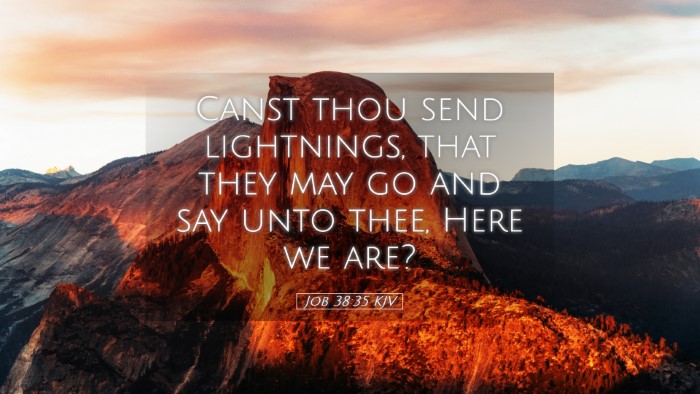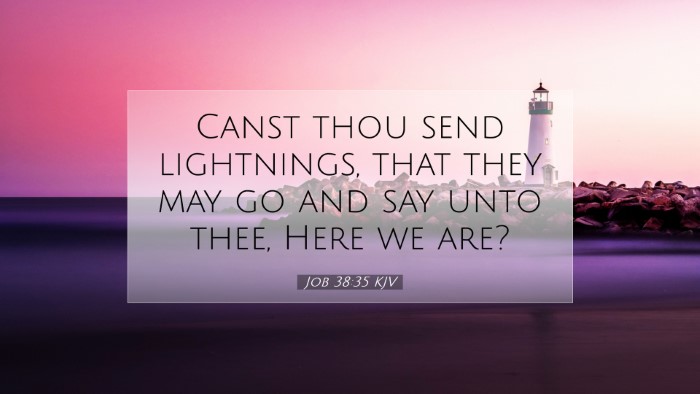Commentary on Job 38:35
Job 38:35 states: "Can you send forth lightnings, that they may go and say unto you, Here we are?"
This verse captures God's response to Job amidst his suffering, emphasizing the divine power and sovereignty over creation. It signifies a pivotal moment wherein God speaks directly to Job, highlighting the incomprehensible majesty of the Creator.
Contextual Analysis
The Book of Job is a profound poetic work that explores the themes of suffering, righteousness, and divine justice. As Job grapples with tremendous personal loss and seeks answers, God's answer involving creation reminds Job of his limitations as a human being. In Chapters 38-41, God poses a series of questions that reveal His omnipotence and the vastness of His creation, positioning Job to acknowledge his own smallness in the grand scheme of the universe.
Insights from Public Domain Commentaries
Matthew Henry's Commentary
Henry emphasizes the rhetorical nature of God's questions, asserting their function in drawing out humility from Job. He notes that the lightnings are a manifestation of God's power that He commands with authority. This illustrates that, unlike humans, God has complete control over nature's forces. Job's inability to respond to such inquiries illustrates human limitations and the futility of questioning divine wisdom.
Albert Barnes' Notes on the Bible
Barnes reflects on the imagery of light and lightning as symbols of divine presence and power. He underscores that the question posed to Job underlies the broader theme of God's providential care and creative authority. The lightnings, being swift and uncontrollable, point to God's sovereignty and omniscience—qualities that remind believers of their dependence on God’s will. Barnes articulates that this verse exemplifies the natural world's responsiveness to God's command, contrasting it with human obstinacy in the face of divine authority.
Adam Clarke's Commentary
Clarke dives into the significance of light in Scripture, linking it to knowledge and revelation. He interprets God's query about lightnings as an invitation to realize that creation itself responds to God’s command. Clarke draws from the idea that Job, in his lament, sought answers to deep theological questions, yet was reminded of his place as a mere creature. Clarke suggests that this verse serves to elevate understanding beyond the immediate circumstances of suffering into the realm of God’s overarching providence and the interconnectedness of creation.
Theological Implications
-
Divine Sovereignty: The passage illustrates that God is the ultimate authority over creation. His ability to command lightning emphasizes His power and control over even the most powerful natural forces, serving as a reminder to believers of God's active involvement in the world.
-
The Nature of Suffering: Job’s plight provides context for understanding human suffering in relation to divine sovereignty. The questions posed by God can deepen one's faith by recognizing that while suffering may seem senseless, God orchestrates all events for His purposes.
-
Humility Before God: This text challenges believers to adopt a posture of humility. Recognizing God's omnipotence compels individuals to step back from their finite understandings and submit to the divine will, cultivating a spirit of reverence and awe.
Practical Applications for Ministry
This scripture is immensely applicable in pastoral care and teaching. When congregants grapple with suffering or doubt, this passage provides a basis for discussion on the nature of God and the human condition.
-
Encouragement in Trials: Pastors can encourage those in suffering by reminding them of God's sovereignty. Just as Job was reassured of God's hand in the universe, individuals today can find peace knowing God remains in control.
-
Liturgical Reflection: The imagery of light can be integrated into worship through prayers and hymns that celebrate God’s creative power and sovereignty, painting a vivid picture for congregants.
-
Teaching on Creation: Understanding God's authority over creation can prompt discussions in Bible studies about the relationship between humans and the natural world, encouraging stewardship and reverence for life.
Conclusion
Job 38:35 serves as a profound reminder of the vastness of God's power and the humility required of His creation. By examining insights from Matthew Henry, Albert Barnes, and Adam Clarke, one can appreciate the theological richness of this verse. When approaching life's complexities, believers are called to remember who God is—mighty, sovereign, and ultimately good. The questions posed in this verse not only invite introspection but also encourage a deeper trust in the divine plan, transcending human understanding and experience.


